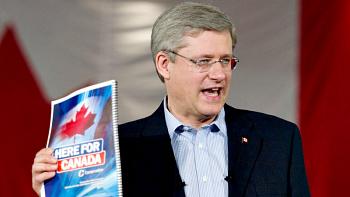Elections Canada: Conservatives used Americans to campaign -- Illegal
(BrockPress.com) -- While the “robo-call” scandal continues to make headlines, a far less publicised allegation has recently surfaced. Several tweets from feeds associated with the Ohio-based campaign organizer Front Porch Strategies indicate that executives from the company describe visits to various locations in Canada during which they provided physical support to Conservative Party candidates.
Receiving this kind of support from non-residents is banned by Section 331 of the Canadian Elections Act.
“No person who does not reside in Canada,” the law reads, “shall, during an election period, in any way induce electors to [...] vote or refrain from voting for a particular candidate”.
According to Brock University Political Science Professor Livianna Tossuti, it has been common for several years for Canadian parties on either side of the spectrum to receive advice from the Democratic and Republican parties in the United States. Likewise, it has also been common for Canadian parties to hire out American campaign organizers as consultants or for similar duties.
“American political consultants have been hired to advise parties in Canada, Australia, the UK and other countries because they are recognized as [being] highly effective,” Tossuti said.
None of this behaviour is banned, and Canadian parties have employed American firms more or less openly for years. What is banned, however, is bringing non-residents into Canada to physically campaign – which is exactly what the tweets say had occurred. The tweets frequently refer to Matthew “Matt” Parker and Philip “PJ” Wenzel, both of whom are listed on Front Porch Strategies’s Web site.
“Matt and PJ are heading to Toronto tomorrow [April 19, 2011] to campaign for the Conservative Candidates!” said one tweet.
“Front Porch is on the front lines as Conservatives are taking over Canadian Parliament!” said another, from May 2.
Another tweet mentions “knocking [on] doors” for St. Catharines’s Conservative Member of Parliament (MP) Rick Dykstra. Dykstra was unable to offer comment on this story as he had been dispatched on what one of his aids called “a fact finding mission” in Sri Lanka.
Front Porch Strategies did not respond to a request to be interviewed for this article. The tweets have not been deleted, however, and can still be read by simply scrolling through the feed @FPStrategies. According to one tweet from May 4, all of the candidates that employed Front Porch Strategies had won in their ridings, although there is little information on exactly which candidates this includes.
The past few months have been a trying time for the Conservative Party, which has spent a great deal of time fighting allegations of voter suppression in several close ridings during the 2011 federal election. Since the end of the election, there had been about a 10-point dip in the Party’s approval rating according to the research company Nanos, but it is difficult to tell if this is because of the controversy or something else.
“The ‘robo-call’ issue is just one of several issues that might account for the drop in Conservative support,” Tossuti said. “Whether the issue has staying power will depend on whether it continues to receive front-page play, and how much the Elections Canada investigation into the allegations uncovers.”
An Elections Canada investigation into the controversy is ongoing.
Photo credit: Ben Perez, Brock Press
Internet site reference: http://www.brockpress.com/news/external-news/conservative-party-may-have-broken-election-law-1.2828426#.T3Si7lvG1_c
Comments
There are 0 comments on this post
















